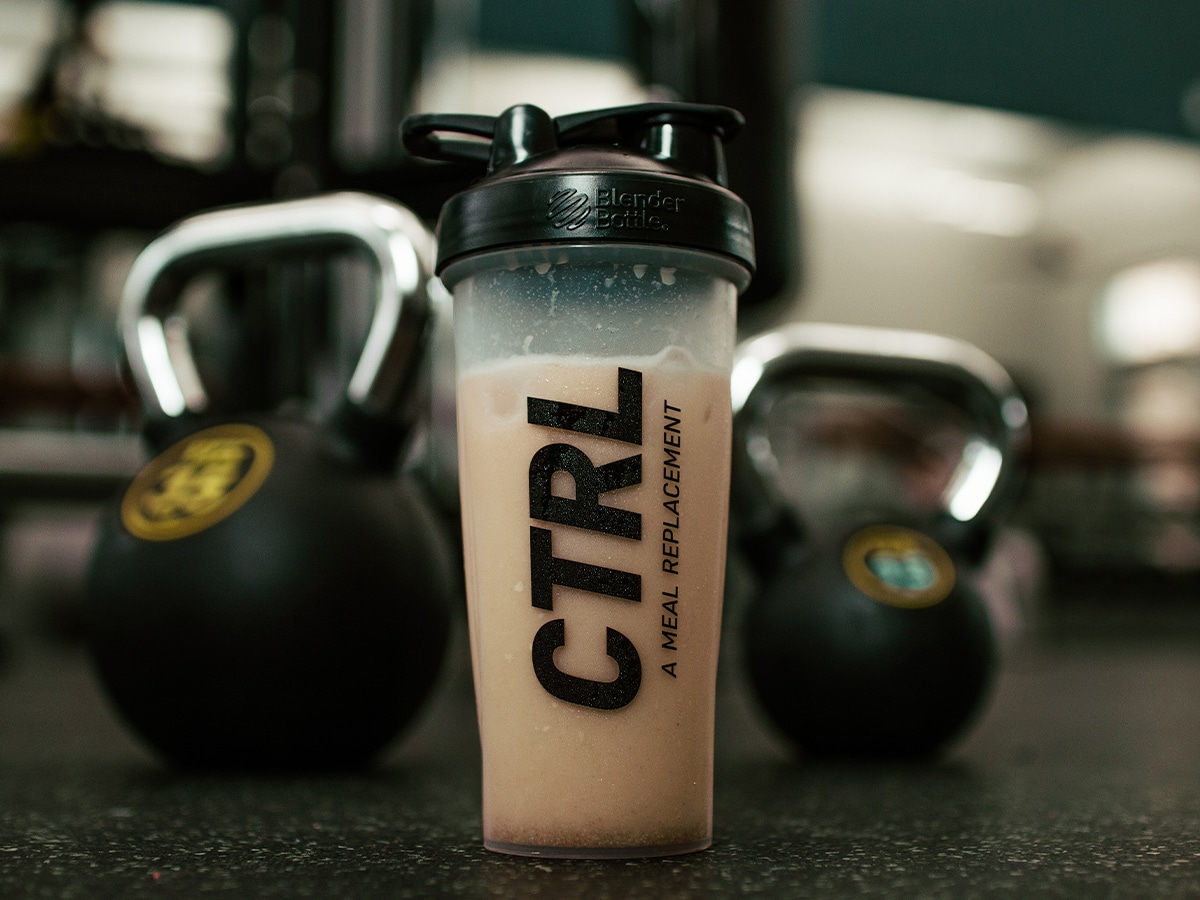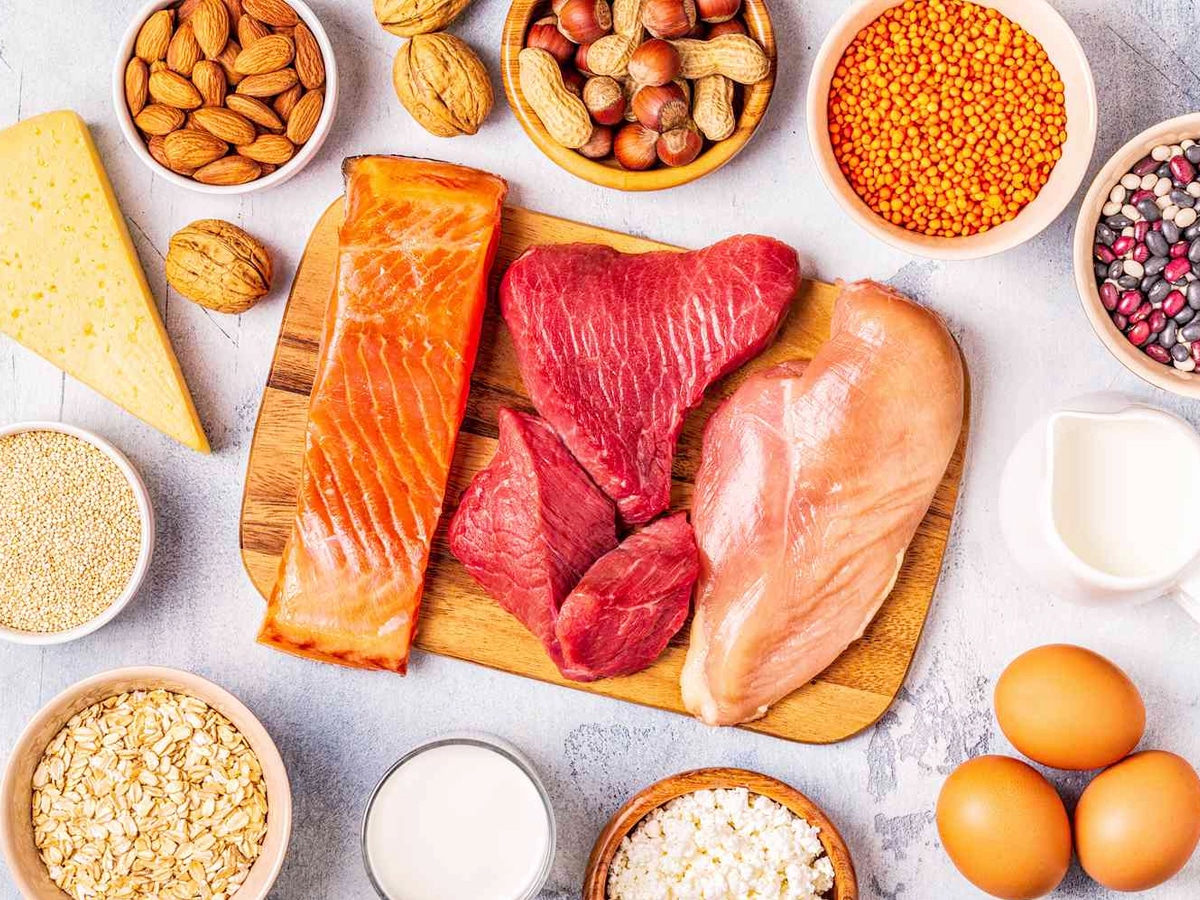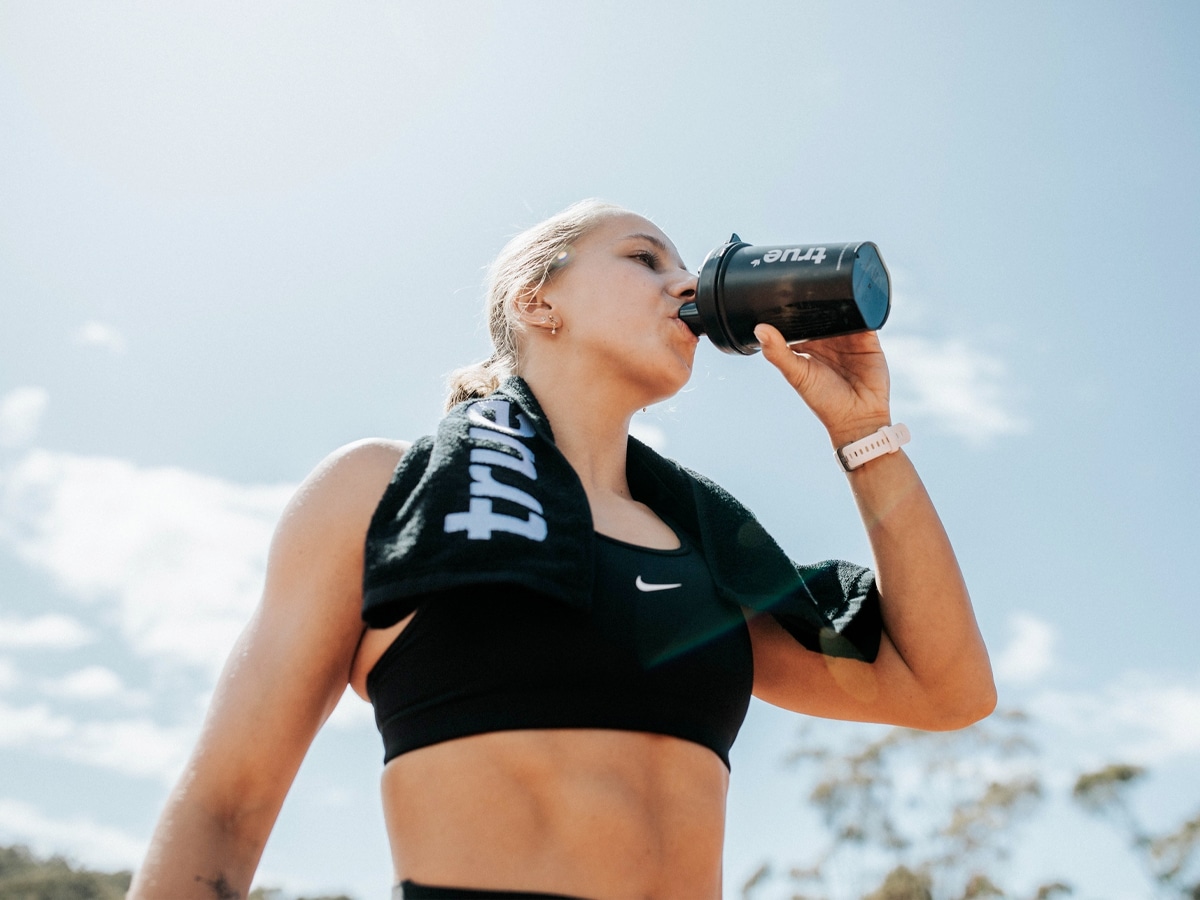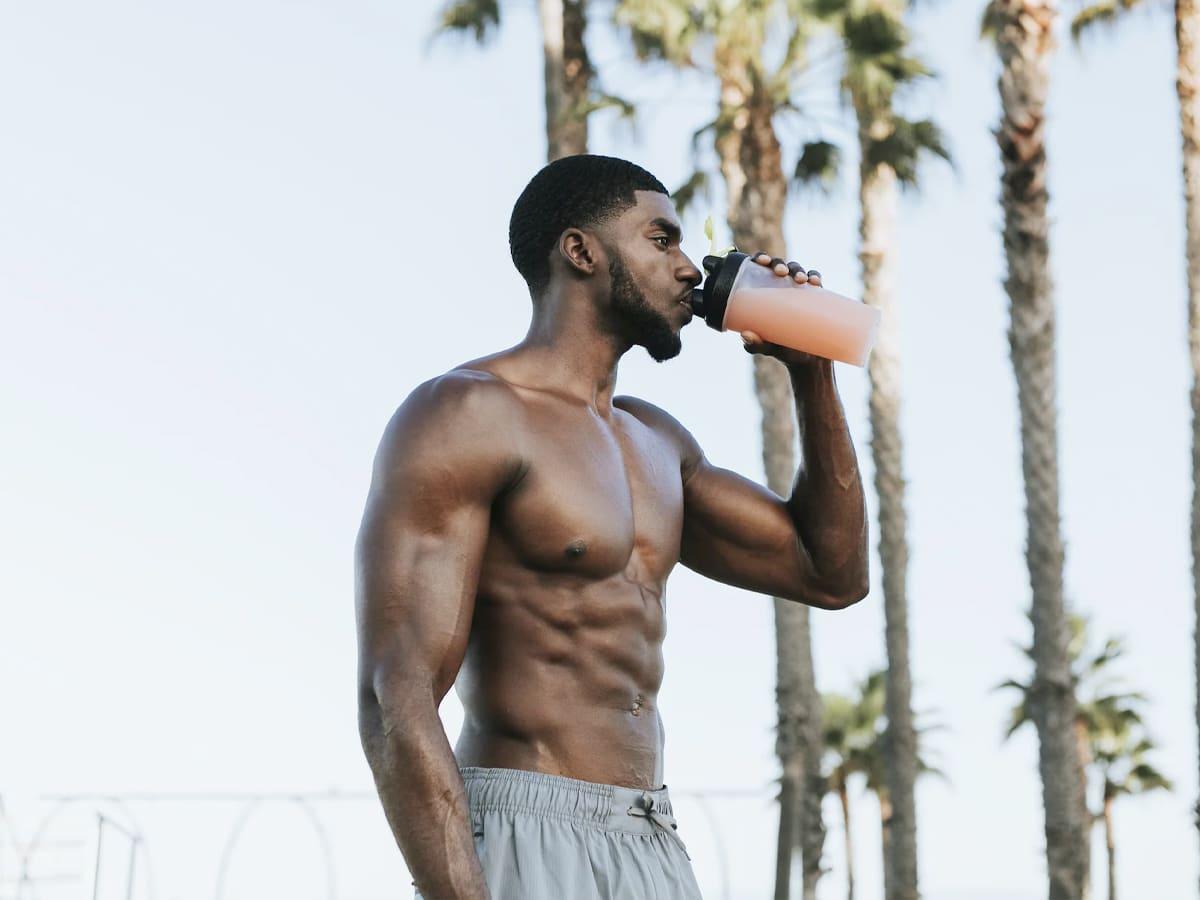
Published:
Readtime: 13 min
Every product is carefully selected by our editors and experts. If you buy from a link, we may earn a commission. Learn more. For more information on how we test products, click here.
When it comes to essential nutrients, there is one fuel source that sits pretty on top of the totem pole of health; protein. Aside from water, the budding macronutrient is just about the most important thing you can put in your body. From muscle growth and bodybuilding to weight loss and health management, protein has been touted as the be-all and end-all of your health needs, but how many grams of protein per day is enough? The US Food and Nutrition Board recommends 0.8 grams of protein per kilogram of weight, however, research indicates that different fitness goals will require different protein intakes. (1)

Understanding your correct daily protein intake is essential to your overall health, and it can be a fine balance to get it right. Eat too much and you risk putting on a significant amount of fat; eat too little and you fail to fuel your muscle fibres for growth and maintenance effectively. While there is no hard and fast rule for how many grams of protein per day is required, there are certain steps you can take to ensure you are getting the optimum amount.
How Much Protein Should I Have Each Day?
Once you’ve decided to up your daily protein intake, whether it be through buying protein powders, protein supplements or red meat, you need to set targets. The most basic and common formula for how much protein you should eat per day comes from the US Food and Nutrition Board. It reads as follows;
- 0.8 grams of protein per kilogram of weight
In this instance, a 100kg man will require 80 grams of protein per day. While this Dietary Reference Intake (DRI) is a great basis for starting your protein journey, there are other factors that play into the mix. As fitness coach and MyFitnessPal ambassador, Luke Hines explains, there is no one-size-fits-all approach to intake.
“When you put your data into a tracking app, it’s important that you’re not just putting your food and you’re not just putting your recipes,” Hines says. “You need to be inputting your age, your steps, your height, your weight, your activity level, you’re inputting the type of workouts you’re doing, and it’ll give you an approach of how much you should be having for your day.”
When we talk about recommended daily intakes of things like protein, more often that not, we’re talking about the average requirement you need to survive, not necessarily thrive.
“When you start to dig a little bit deeper and scratch the surface, you might say, “Okay, I want to put on lean muscle mass, and I want to increase my strength each week periodically in the gym.” You want to be going above and beyond any averages to be less than average yourself.”

As Hines rightly explains, whether you are sedentary or active, how much water you drink and the genetic and macronutrient make-up of the other foods you eat will play into your required protein intake. The Academy of Nutrition and Dietetics, American College of Sports Medicine and the Dietitians of Canada suggest that athletes, for example, need more protein. (2)
The organisation notes that those who participate in activities like running, cycling, or swimming on a regular basis consume 1.2 to 1.4 grams of protein per kilogram of body weight per day. Further, strength-trained athletes, such as powerlifters consume 1.6 to 1.7 grams of protein per kilogram of body weight. Here is a very basic run-down of recommended protein intake by activity level;
- Sedentary – Multiply by 0.5
- Light activity – Multiply by 0.6
- Moderate – Multiply by 0.7
- Active – Multiply by 0.8
- Very Active – Multiply by 0.9
- Athlete – Multiply by 1.0
The easiest way to get an accurate protein intake goal down-pat is to determine your current daily calorie expenditure. Understanding how many calories you eat on the whole will allow you to chart the percentage that needs to be allocated to protein.

What is Protein?
While most of us have certainly heard of protein and know that it is something to be aware of, few people truly understand its true purpose and function. A recent study from global nutrition and food tracking app MyFitnessPal revealed that only a quarter of Australians are aware of their ideal protein intake, while an additional three in four are unaware of how to track their own intake.
Put simply, protein comes in many different forms and is used as the foundation for muscle, tendon, organ and skin growth. The macronutrient is among the most efficient fuel sources in our daily diet and can also help in the production of enzymes, neurotransmitters and hormones essential for cognitive brain and muscle function. As fitness coach and MyFitnessPal ambassador, Luke Hines explains, the macronutrient is the cornerstone for a number of vital functions.
“If we get into the nitty-gritty of protein, as a macro, it’s amino acids, and amino acids are the building blocks of muscle and bone repair, strength recovery, everyday functioning, picking things up, putting things down, brain function. It is such an important macro,” Hines tells us. “If you understand what role it plays in your health and the impact it’ll have on your risk, your recovery, strength, longevity, anti-ageing, everything, it’s huge.”
From a scientific viewpoint, proteins are made out of molecules called amino acids, which are linked together like beads on a string. The chains are often referred to as protein chains, which are folded into complex shapes once they become long enough. While your body is effective at producing some amino acids naturally, others must be supplemented through food and diet choices. We call these essential amino acids.
Delving deeper, all protein is categorised into three types;
- Fibrous Proteins – These proteins form muscle fibre, tendons, connective tissue and bone.
- Globular Proteins – These proteins are more water-soluble than others and have a wealth of functions that include transporting, catalysing and regulating.
- Membrane Proteins – These proteins have a number of key roles that include relaying signals within cells and transporting molecules.

Types of Protein
As we said, protein is a complex beast that encompasses many different functions and forms. Different types of proteins will offer different qualities and quantities, as such; a balanced diet should include many different versions. The most common and generally effective protein source is animal protein. (4)
Animal Proteins
As animals have similar genetic make-ups to humans, this form of protein provides all essential amino acids in the appropriate ratios. This, in turn, makes animal protein easy to digest and highly important in the development of muscle fibres. Foods that are rich in animal proteins include;
- Red meat
- Eggs
- Fish
- Dairy
However, while animal protein is indeed highly effective in the maintenance of muscle, tendon and organ health, it isn’t the only way to up your protein intake.
Plant Proteins
For those among us who aren’t too fond of eating meat or dairy, there are other options. You can find a wealth of natural protein in certain plants and plant products. These include;
- Seitan
- Tofu
- Lentils
- Chickpeas
- Green peas
- Quinoa
- Soya beans
- Nuts
Protein Supplements
Another great way to up your daily protein intake is to add protein supplements to your diet. By using protein powder you can hit those key protein targets with ease. Even better, these protein supplements are generally low in carbohydrates and calories. These include;
- Protein concentrates
- Protein isolates
- Protein hydroisolates

Protein for Weight Loss
It’s no secret that protein is incredibly valuable when it comes to weight loss, but it’s not as simple as just eating more protein and watching the kilos strip off. Eating a high-protein diet has been proven to boost your metabolic rate, allowing you to burn more calories. Getting around 30 per cent of your total daily calories from protein has been shown to improve metabolism by around 80-100 calories per day, when compared to lower protein diets. However, while the metabolic rate does improve with higher protein consumption, that isn’t the only benefit. (3)
“For so long, calories were associated with minimisation, reduction, cutting, can’t have this, can’t have that, and also counting, but I actually think people should use calories for good, not evil,” Hines says. “Ultimately, calories are a measurement of energy, and that energy is measured through our macros, proteins, fats, and carbs. Now, when we look at a pie chart of fat, proteins, and carbs, if you open that pie and do a bigger piece of protein, that means there’s less room for those discretionary foods, for those processed and refined foods.”
“If you want to lose weight, you can still up your protein. If you want to gain lean muscle, you can fill up your protein. It’s like the super macro.”

Eating a high-protein diet will help reduce your appetite. By eating more protein, you feel fuller for longer, preventing you from snacking or eating more. In fact, a recent study from PubMed Central found that obese men who upped their daily protein intake to 25 per cent of total calories reported increased feelings of fullness. Additionally, the desire to snack at night halved and obsessive thoughts about food were reduced by 60 per cent. (5)
If you are looking to lose weight, protein is almost always the best place to start. Regardless of your chosen style of diet, whether it be intermittent fasting, the paleo diet or the ketogenic diet, all aspects are heavily dependent on strong protein intake. According to Hines, the most important factor is selecting foods that are ‘nutrient dense’.

What is Nutrient Density?
Whether it be losing weight or building muscle, tracking macronutrients will reveal one thing – not all foods are created equal. Whatever your goal, choosing foods that have a high density of nutrients will ultimately serve you better, but what does the buzzword nutrient dense really mean?
“Calories are a unit of energy, and every calorie goes towards our day. We’ve often heard of fast food referred to as food that is ’empty calories’ and that means that it is a high-calorie count for a low return on protein, fats, and carbs. It’s usually full of refined sugars and other fillers,” Hines explains.
“The opposite of that is nutrient-dense. It means that, for every calorie you’re eating, you’re getting a really good broad spectrum of those macros. So if we’re talking nutrient-dense protein, we’re talking nature’s first superfood, eggs, we’re talking grass-fed beef, we’re talking free-range chicken, we’re talking sustainably cooked fish, if we’re talking fats, we’re talking avocados, macadamias, extra virgin olive oil, and carbohydrates, below-ground-grow veggies. They’re nutrient-dense sources of those macros rather than fillers, fakes, or replacement versions.”

Common Protein Mistakes and Misconceptions
Most men know the importance of protein, but there are a few key mistakes that we often make. These generally relate to the amount of protein we consume without realising it.
- Over-consumption – When you eat too much protein, your body stores it as fat. Some studies suggest that excess protein is excreted in urine, but only a small portion is actually released. Instead, that protein is converted to glucose for energy and stored as fat. Should you eat too much protein, you will undoubtedly increase your calorie consumption, meaning you will run the risk of putting on weight.
- High-sugar protein supplements – When you are adding protein powders to your diet, be wary of the carbohydrate content in your shake. While most whey protein isolates are low in calories, some others have a high proportion of sugar, making you susceptible to weight gain and calorie surplus.
- Shakes over meals – While the protein shake has been touted as a meal replacement, it doesn’t quite have the same impact as a full-blown feed. When you eat a full meal, your body has to work harder to digest it, meaning you use up more calories in the process.
You’ll also like:
- YoPRO High-Protein Ice Cream Sticks Won’t Undo Your Hard Work
- Are Protein Shakes Healthy? Key Facts on Whey Protein
- Best Australian Protein Brands
- Mood Boosting Foods that Lift Spirits
Protein Per Day FAQs
The DRI (Dietary Reference Intake) is 0.8 grams of protein per kilogram of body weight, or 0.36 grams per pound. This amounts to: 56 grams per day for the average sedentary man. 46 grams per day for the average sedentary woman.
Excess protein is usually stored as fat, while the surplus of amino acids is excreted. Ultimately, this can lead to weight gain, particularly if you consume too many calories trying to increase your protein intake.
Eating a protein rich diet can result in some digestive issues, but that usually has less to do with protein and more to do with a lack of fibre. To compensate, it is advised that you eat a diet rich in fibrous carbohydrates, even if you are trying to increase protein intake.
Citations
- Thomas, D. T., Erdman, K. A., & Burke, L. M. (2016). Position of the Academy of Nutrition and Dietetics, Dietitians of Canada, and the American College of Sports Medicine: Nutrition and Athletic Performance. Journal of the Academy of Nutrition and Dietetics, 116(3), 501–528. https://doi.org/10.1016/j.jand.2015.12.006
- Thomas, D. T., Erdman, K. A., & Burke, L. M. (2016). Position of the Academy of Nutrition and Dietetics, Dietitians of Canada, and the American College of Sports Medicine: Nutrition and Athletic Performance. Journal of the Academy of Nutrition and Dietetics, 116(3), 501–528. https://doi.org/10.1016/j.jand.2015.12.006
- National Academies of Medicine. Dietary Reference Intakes for Energy, Carbohydrate, Fiber, Fat, Fatty Acids, Cholesterol, Protein, and Amino Acids (Macronutrients).
- Smith JD, Hou T, Ludwig DS, Rimm EB, Willett W, Hu FB, Mozaffarian D. Changes in intake of protein foods, carbohydrate amount and quality, and long-term weight change: results from 3 prospective cohorts–. The American journal of clinical nutrition. 2015 Apr 8;101(6):1216-24.
- Leidy, H. J., Tang, M., Armstrong, C. L., Martin, C. B., & Campbell, W. W. (2011). The effects of consuming frequent, higher protein meals on appetite and satiety during weight loss in overweight/obese men. Obesity (Silver Spring, Md.), 19(4), 818–824. https://doi.org/10.1038/oby.2010.203


































Comments
We love hearing from you. or to leave a comment.